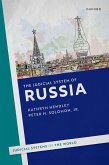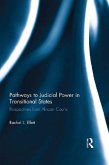This book argues that explaining judicial independence-considered the fundamental question of comparative law and politics-requires a perspective that spans the democracy/autocracy divide. Rather than seeking separate explanations in each regime context, in The Political Foundations of Judicial Independence in Dictatorship and Democracy, Brad Epperly argues that political competition is a salient factor in determining levels of de facto judicial independence across regime type, and in autocracies a factor of far greater import. This is because a full "insurance" account of independence requires looking not only at the likelihood those in power might lose elections but also the variable risks associated with such an outcome, risks that are far higher for autocrats. First demonstrating that courts can and do provide insurance to former leaders, he then shows via exhaustive cross-national analyses that competition's effects are far higher in autocratic regimes, providing the first evidence for the causal nature of the relationship. Epperly argues that these findings differ from existing case study research because in democratic regimes, a lack of political competition means incumbents target the de jure independence of courts. This argument is illustrated via in-depth case study of the Hungarian Constitutional Court after the country's 2010 "constitutional coup," and then tested globally. Blending formal theory, observational and instrumental variables models, and elite interviews of leading Hungarian legal scholars and judges, Epperly offers a new framework for understanding judicial independence that integrates explanations of both de jure and de facto independence in both democratic and autocratic regimes.
Dieser Download kann aus rechtlichen Gründen nur mit Rechnungsadresse in A, B, BG, CY, CZ, D, DK, EW, E, FIN, F, GR, HR, H, IRL, I, LT, L, LR, M, NL, PL, P, R, S, SLO, SK ausgeliefert werden.









